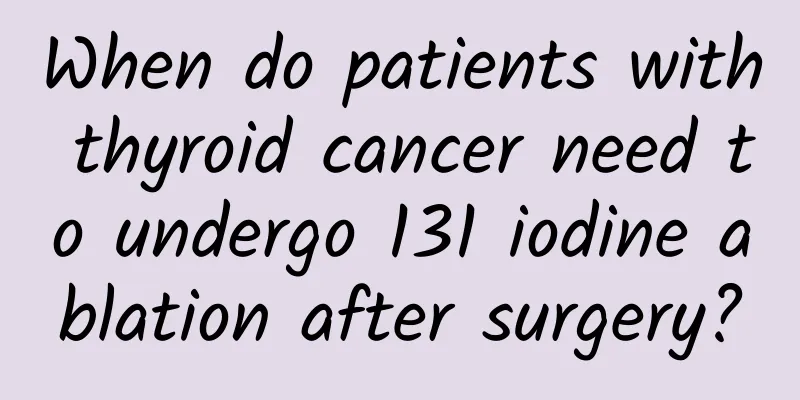When do patients with thyroid cancer need to undergo 131 iodine ablation after surgery?

|
When do patients with thyroid cancer need to undergo 131 iodine ablation after surgery? Thyroid cancer is a tumor that can be survived for a long time, but its recurrence risk varies. Postoperative pathological staging evaluation helps to assess the patient's risk of recurrence. During the evaluation process, patients with intermediate risk or above need to receive 131 iodine ablation. The purpose of ablation is to remove residual thyroid tissue after surgery, so as to more accurately assess the risk of thyroid cancer recurrence and create conditions for subsequent 131 iodine treatment. Image from the InternetEdit Importance of risk assessment for recurrence after thyroid cancer surgery Postoperative recurrence risk assessment for thyroid cancer is a key step in predicting the probability of postoperative recurrence in patients. Through the assessment, patients can be divided into three levels: low, medium, and high risk. This assessment system helps doctors develop targeted treatment plans and provide personalized rehabilitation guidance for patients. How to understand the difference between iodine-131 thyroid ablation treatment and iodine-131 treatment of hyperthyroidism? The treatment principle of iodine-131 ablation of thyroid gland is very different from that of iodine-131 treatment of hyperthyroidism. Hyperthyroidism is a disease of thyroid dysfunction, and iodine-131 treatment achieves its therapeutic purpose by destroying thyroid tissue. However, iodine-131 ablation of thyroid gland aims to eliminate residual thyroid tissue after surgery so as to more accurately evaluate and treat thyroid cancer. Therefore, iodine-131 ablation of thyroid gland should not be confused with iodine-131 treatment of hyperthyroidism. Significance of focusing on risk assessment of postoperative recurrence of thyroid cancer and thyroidectomy Understanding the risk assessment of postoperative recurrence of thyroid cancer and the knowledge of thyroid ablation treatment is of great significance for the treatment and rehabilitation of thyroid cancer. This not only helps patients and their families understand the disease, but also protects the health of patients and improves their quality of life. At the same time, doctors and patients should communicate closely and jointly develop appropriate treatment plans to ensure that patients get the best results. Summarize When to perform iodine-131 ablation for thyroid cancer patients after surgery depends on the patient's recurrence risk assessment. Ablation therapy aims to eliminate residual thyroid tissue and create conditions for subsequent iodine-131 treatment. Ablation therapy is fundamentally different from iodine-131 treatment for hyperthyroidism and should not be confused. Paying attention to the knowledge of recurrence risk assessment and ablation therapy for thyroid cancer after surgery will help focus on the treatment and recovery of thyroid cancer and protect the health of patients. |
<<: How to prevent anisometropia?
>>: Urgent reminder! Imported cases of malignant malaria found in Luoyang
Recommend
How to delay your period
In life, we often hear some girls ask how to dela...
What elements should children with anemia supplement? What foods should children with anemia eat to supplement iron?
Anemia is a common disease, mainly caused by the ...
There will be two lines on the pregnancy test paper before menstruation
There will be two bars on the pregnancy test pape...
Is natural abortion harmful?
Abortion is a common problem nowadays. It is very...
Will I feel stomach discomfort during early pregnancy?
In the early stages of pregnancy, as the pregnant...
How long can I take a bath after giving birth in summer?
We all know that many women cannot take a bath du...
Why do our immune systems vary so much?
Produced by: Science Popularization China Author:...
What to do if the cervix is sticky
For many women, factors that may damage the endom...
Why do babies have fevers when they are teething? How to tell if a baby has a fever during the teething period?
Babies do have some abnormal behaviors or symptom...
Black color when menstruation is almost over
Many women find that the color of their menstrual...
Washing the vagina with soda water can cure itching
Vulvar itching can cause women to find the itchin...
What does it mean when a woman can’t let go of her old love?
Women often yearn for a beautiful love, a warm ma...
Why do women have frequent and urgent urination?
Urinary urgency and frequent urination are very c...
39 weeks, occasional vaginal pain
People often say that pregnancy takes ten months,...
Which type of lychee is the most delicious? Which type of lychee is the most expensive?
There are many varieties of lychees, among which ...









